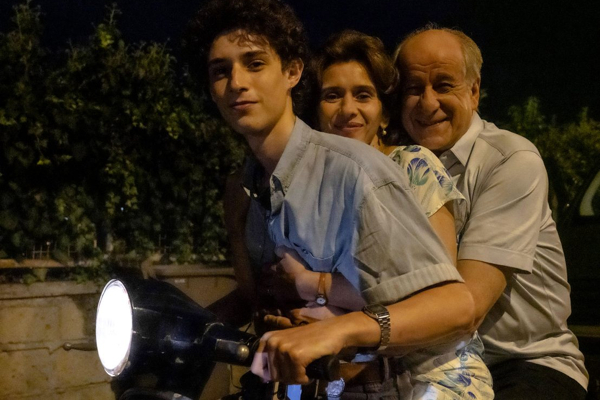
‘The Hand of God’ autobiographically profiles the Neapolitan Schisa family
By Diane Carson
Taking charge of his own story in “The Hand of God,” director Paolo Sorrentino dramatizes his experiences growing up in 1980s Naples. Through his surrogate, Fabietto, he captures the animated, loving Schisa family. With homages to Fellini’s style and the Italian love of soccer, as embodied by Diego Maradona, this autobiographical film transcends specific events while also honoring them.
Alternately erotic, comical, tragic, and heartbreaking, seventeen-year-old Fabio wrestles with decisions about his future life, choosing between cinema’s appeal and exciting criminal behavior, and the security of his extended Neapolitan family and Rome’s promise. And what a family Fabio has, including his nurturing, prankster mother; his loving father with a long-time mistress; a devoted older brother; a sister who won’t come out of the bathroom; uncles, and aunts, especially Aunt Patrizia after whom the men lust. Her allure is overly sexualized, including unnecessary full nudity, but she proves a sympathetic character by the story’s end as does the chilly baroness who lives upstairs. Above all, this is a roller coaster ride of thrills and confusion for Fabio determining his values.
The opening shot announces Sorrentino is a consummate director. A helicopter soars over the sea passing over motorboats, sliding effortlessly toward Naples, with sound intermixing the copter blades, the waves, gulls calling, the sound of children, and fireworks. This layered soundscape complements many scenes which exude a vibrancy: an outdoor family lunch, celebration of the great soccer star Maradona, a chilling hospital confrontation, and a speedboat ride one evening. Moreover, Sorrentino seamlessly integrates a fairy tale Monk and religion, Felliniesque moments with stark reality, wisdom with impulsive behavior, all artistically realized through Daria D’Antonio’s expert cinematography.
At this year’s Telluride Film Festival Q&A, Sorrentino explained that the title “The Hand of God” derives from Maradona’s first goal in the 1986 World Cup in Mexico, but it is cleverly connected to Fabio. Sorrentino added that when he turned fifty, he switched priorities from aesthetics to emotion. In fact, here he achieves a perfect blend of both. Surprisingly, then, Sorrentino compared making this film with going to the dentist, saying, “You put it off and put it off. When you finally go, you suffer but then you emerge liberated.” There’s no suffering for us here. Again, curiously, within the film Sorrentino quotes Fellini, who said “Cinema’s not good for anything, but it is a distraction.” “From what?” “From reality.” But the best cinema also captures life, as Sorrentino does here. In Italian with English subtitles, “The Hand of God” screens at cinemas and will stream on Netflix beginning December 15.


